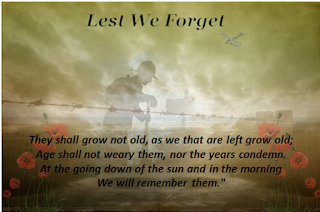On 25 April, Australians will commemorate Anzac Day. Anzac
Day is the day we remember those who died in all wars. ‘Anzac’ stands for
‘Australian and New Zealand Army Corps’.
When World War I broke out in 1914, Australia had only been
a federation for 13 years, with a population of fewer than 5 million people. It
was very much part of the British Empire, and so when Britain entered the war,
Australia automatically joined as well.
On 25 April 1915, Australian and New Zealand forces landed
on the Gallipoli peninsula in Turkey. The idea was to capture Gallipoli and
from there, to take over Constantinople, which was the capital of Turkey at the
time.
The Australian and New Zealand soldiers met very strong
resistance from the Turkish soldiers and both sides suffered terrible
casualties. More than 8,000 Australian soldiers died during this 8 month
campaign and it had a profound effect on Australians back home.
As Australia was a young country with a small population,
this loss of life became a defining point in its history, and from it, the
Anzac legend of courage, mateship and sacrifice grew.
The first anniversary was held in 1916, and every year since
then, Australians not only remember the lives lost at Gallipoli, but all those
who have died in war.
A dawn service has been held every year since 1927.
Initially this was a very simple ceremony involving veterans of the war to
gather, remember and reflect on their experiences. Today, as all the veterans
of World War 1 have passed away, the dawn service not only includes the family
members of these veterans, but anybody else who wants to gather and pay their
respects and reflect on the meaning of war.
It is a solemn and very moving occasion, as one of our
DL students, Thi Son Ha, who attended a dawn service, wrote in a beautiful passage:
A MOMENT OF ANZAC DAY AT LAKE
CARGELLIGO
In the wind, the voice from another
world whispered "We remember you ....remember you ...remember you
....". Wind then stopped, sunshine didn’t move. Everyone looked beyond the
other side of the lake, such as they tried to find some souls who came back in
the cloud, in the sky or the water of the lake....The wave of the water on the
bank of the lake could be counted as the beats of the hearts. A moment for all of
you who sacrificed your life for the peace of this country as well as the world.
"We remember you, remember you ....!"
- Australians often use the word ‘mate’. How was 'mateship’ shown during the time of war?
- Do you have a similar celebration in your country? If you do, what happens on the day?
- What do you think is the best way to remember those who died in war?















